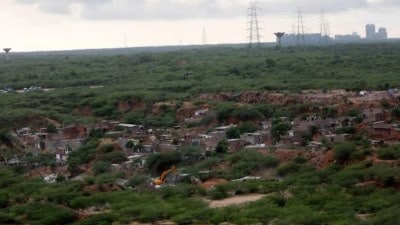Red aurora illuminates Ladakh’s night sky; Hanle observatory captures spectacle
This is not the first time the observatory nestled in the trans-Himalayan region has documented such a mesmerising occurrence.
 Hanle provides an ideal setting for observing celestial phenomena such as auroras.
Hanle provides an ideal setting for observing celestial phenomena such as auroras.
The observatories of Hanle and Merak in Ladakh recently bore witness to an extraordinary event—a vivid red aurora. This phenomenon, seldom seen in the skies above India, captured the attention of astronomers and sky gazers alike.
The Hanle observatory, nestled in the trans-Himalayan region, successfully documented the celestial event as it unfolded towards the northern horizon. But the Merak observatory, situated near Pangong Tso, faced challenges due to nearby mountain obstructions, which limited its view of the crimson display.
This is not the first time the Hanle observatory has documented such a mesmerising occurrence. On April 23, another aurora graced the skies, marking a noteworthy addition to India’s celestial record.
View this post on Instagram
The observatory’s significance lies in its status as India’s sole dark sky reserve. Located in a region where efforts are actively made to minimise light pollution, Hanle provides an ideal setting for observing celestial phenomena such as auroras.
The dark sky reserve offers unparalleled views of the night sky, showcasing a celestial panorama that includes the Milky Way and various constellations. The conservation efforts in Ladakh aim to protect the natural darkness of the night sky, promoting astronomy, astrotourism, and environmental awareness.
Instagram users were stunned. One of them said, “Wow… surreal.” Another wrote, “Whyyyyy do I not have the super power to teleport?” A third netizen posted, “This is stunning”.
As Ladakh’s night sky continues to captivate sky gazers with rare celestial displays, the challenges faced by the Subansiri Lower Hydroelectric Project serve as a reminder of the delicate balance between human endeavours and the forces of nature in the diverse landscapes of India.
- 01
- 02
- 03
- 04
- 05































